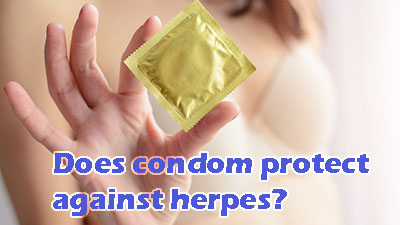Does condom protect against herpes?
Unlike many other sexually transmitted diseases, herpes spreads by skin-to-skin contact instead of through bodily fluids. Since condoms don't cover all areas of potentially infectious skin, they cannot completely stop the spread of herpes.

If you or your partner has herpes, or if you are unsure of a partner's status, you need to use condoms correctly every time you have sex, even when no symptoms are present. Every unprotected sexual exposure increases the risk of herpes transmission, so the intermittent use of condoms is not effective at prevention. Even if you use condoms, it is best to abstain from sexual contact when you have prodromal symptoms and when you have an outbreak.
People who have herpes are twice as likely to get HIV as people who don't. And people who have herpes and HIV have a much bigger chance of passing HIV to their partners. So it's really important to use condoms to help protect yourself and your partner. Read more about herpes and HIV.
Over time, couples in monogamous relationships may decide to forego the condom entirely. There's nothing unreasonable about that at all, and it all depends on your comfort level in the relationship. As your relationship progresses, talk to your partner so you can make a choice that works for you both.
Can Condoms Prevent Herpes Transmission?
Condoms are widely regarded as an effective barrier method for preventing many STIs, including HIV, chlamydia, gonorrhea, and syphilis. When used properly and consistently, condoms significantly reduce the risk of transmitting these infections. But when it comes to herpes, the protection offered by condoms is not absolute. Here's why:
Condoms only cover certain areas:
Condoms are effective at protecting the penis, but they do not cover all areas that may come into contact with the herpes virus. Herpes can be transmitted through skin-to-skin contact on areas not covered by a condom, such as the thighs, buttocks, or pubic area. Even if the infected person has no visible sores, the virus can be transmitted from areas where skin is not protected by a condom.
Asymptomatic Shedding:
As mentioned, herpes can be transmitted even when there are no visible symptoms or sores. This is because the virus can shed from the skin in small amounts, even when the person feels perfectly fine. If the infected person sheds the virus in an area that is not covered by a condom, transmission is still possible.
Proper Condom Use
For condoms to be effective, they must be used correctly every time. This includes putting the condom on before any genital contact and using it throughout the entire sexual act. If a condom is not put on properly or if it breaks during intercourse, the protection against herpes is compromised. Continue to read how to use condoms correctly to prevent herpes transmission.
Have herpes & feel alone? Meet nearby people with herpes

PositiveSingles is one of the most popular dating websites for people suffering from herpes and other STD. It was initiated in 2001. With 1,510,800+ members you are sure to find lots of potentail people around you.
Join and meet nearby people with herpes, browse and chat now!
How likely is it to get herpes with a condom? Studies on Condoms and Herpes Protection
Maybe you want to know effect of condoms on reducing the transmission of herpes. Consistent condom use reduces the risk of herpes transmission from men to women by 96 percent and from women to men by 65 percent. The results showed that people who used condoms 100% of the time had a 30% lower risk of contracting genital herpes. Among less consistent condom users, the risk of HSV-2 infection decreased by 7% for every 25% increase in condom use during vaginal or anal sex.
Researchers found no significant differences between men and women in the level of protection against genital herpes that condom use offered. Condom use should continue to be recommended to both men and women for reducing the risk of HSV-2 acquisition.
Condom use offers significant protection against HSV-2 infection in susceptible women. Changes in sexual behavior, correlated with counseling about avoiding sex when a partner has lesions, were associated with reduction in HSV-2 acquisition over time. These data suggest that identification of discordant couples can reduce transmission of HSV-2, especially for heterosexual couples in which the male partner has HSV-2 infection.
The facts on condoms and foams
Laboratory studies show that:
- The Herpes virus does not pass through latex condoms and, when properly used, latex condoms are likely to reduce your risk of spreading or getting Herpes.
- Condoms are useful in prevention but even the best condoms do not guarantee total safety.
- When Herpes sores occur in places that are not covered by a condom, the condom is of little help in preventing transmission.
- Condoms and foams should not be relied upon when Herpes sores or symptoms are present.
- Spermicidal foams and jellies may offer additional protection. Spermicides used in contraceptive foams, film and gels kill or neutralize HSV in laboratory tests and may provide some protection when used in the vagina (recommended dose is the same as for contraception).
- In test tube trials, it has been shown that some contraceptive foams contain ingredients (such as nonoxynol-9) that kill the Herpes virus and other STDs.
- Foams are best used along with condoms, not in place of condoms.
- Condoms do not provide 100 percent protection because a lesion may be occurring in a place which the condom does not cover. However, when used consistently, condoms are the best available form of prevention aside from abstinence.
Research has shown that condoms can reduce the risk of herpes transmission, but they do not eliminate it completely.
- A 2001 study published in The Journal of the American Medical Association found that condom use reduced the risk of genital herpes transmission by about 30-50%. The study also noted that consistent condom use was the most effective method of protection against herpes, but it was not 100% protective.
- A more recent study from the New England Journal of Medicine (2004) also concluded that while condoms reduce the transmission of HSV-2 (genital herpes), they do not offer full protection against the virus, especially for people with frequent outbreaks or asymptomatic shedding.
Although condoms reduce the risk of transmission, they are not a foolproof method, as herpes can still spread through areas not covered by the condom.
Condom Use as Part of a Comprehensive Strategy
Condoms are an essential tool for preventing many STIs, including herpes, but they are not foolproof. While they reduce the risk of transmission, herpes can still be spread through areas not covered by a condom and through asymptomatic shedding.
Therefore, the best strategy for minimizing the risk of herpes transmission involves combining condom use with other protective measures, such as antiviral medications, avoiding sexual contact during outbreaks, and fostering open communication in relationships.
Ultimately, understanding herpes, being proactive in managing the condition, and taking a multifaceted approach to prevention can allow those living with the virus to have healthy, fulfilling relationships while minimizing the risk of transmission. Always consult with a healthcare provider for personalized advice on managing herpes and protecting both yourself and your partner.
Can I ever have unprotected sex again with herpes?
The prospect of resuming unprotected sex after being diagnosed with herpes is a common concern for many people living with the virus. While herpes is a manageable condition, it's essential to understand that the decision to have unprotected sex involves assessing the risks and understanding how to best prevent transmission.
Unprotected sex with herpes always carries some risk of transmission, even if the person with herpes is asymptomatic. The virus can shed from the skin even when no visible sores are present, which means that transmission is possible without outward signs of an outbreak. That said, there are ways to significantly reduce the risk of passing the virus to a partner.
Maintaining open communication with your partner about your herpes status, using condoms or dental dams, and avoiding sex during outbreaks are crucial steps to reduce the chance of transmission. If both partners are informed, comfortable, and committed to managing the virus, some may feel comfortable engaging in unprotected sex. However, the decision should always be made with caution, recognizing the potential risks and having a clear conversation about consent and prevention.
For many people living with herpes, finding someone who truly understands their experience can bring a sense of relief and empowerment. Dating someone who is also living with herpes can significantly reduce the stress and anxiety that often comes with disclosing your status, worrying about transmission, and navigating a relationship with the fear of rejection. This is why many people with herpes choose to seek out others with the same condition for a fulfilling, stress-free, and, in some cases, unprotected sex life.
Online dating platforms like PositiveSingles offer a safe and supportive space where individuals with herpes can connect with others who share their experiences. These sites are specifically designed for people with herpes, so members can engage in relationships without the constant fear of rejection due to their status. The stigma surrounding herpes can be isolating, but when people come together in a community where everyone understands the challenges, it helps create a more open and accepting atmosphere.
For many, joining a herpes-specific dating site brings a sense of freedom. Knowing that their partner understands the reality of herpes—how it's managed, the risks involved, and the need for communication—can make the relationship feel more authentic and less stressful. Many people with herpes also feel comfortable pursuing unprotected sex with partners on these platforms, especially when both individuals are on daily antiviral medications and are committed to open communication about their sexual health.
Worrry about herpes tranmission? Meet nearby people with herpes

PositiveSingles is one of the most popular dating websites for people suffering from herpes and other STD. It was initiated in 2001. With 1,510,800+ members you are sure to find lots of potentail people around you.
Join and meet nearby people with herpes, browse and chat now!
Know more facts about living and dating with herpes:
- What condoms are best for preventing herpes?
- How to have a fulfilling sex life with herpes
- What is your chance of spreading herpes?
- Fear transmission? Try herpes dating sites
- How to handle dating when you have herpes
- How to tell your partner you have herpes
- Overcome the stigma of herpes
- Herpes and getting pregnant: How to protect your baby
- Herpes and HIV
- Do condoms prevent herpes? How likely is it to get herpes with a condom?
